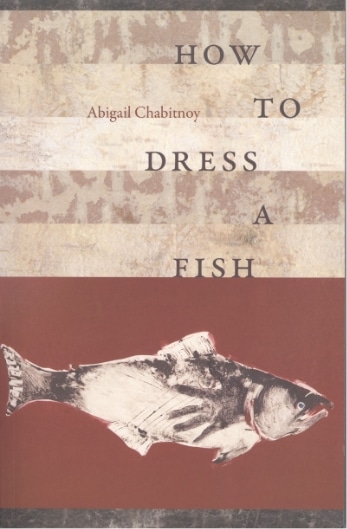
Abigail Chabitnoy earned her MFA in poetry at Colorado State University and was a 2016 Peripheral Poets fellow. Her poems have appeared in Hayden’s Ferry Review, Boston Review, Tin House, Gulf Coast, LitHub, and Red Ink among others. She is a Koniag descendant and member of the Tangirnaq Native Village in Kodiak, Alaska, grew up in Pennsylvania, and currently resides in Colorado. How to Dress a Fish is her debut poetry collection.

Judges’ Citation
Bringing languagelessness into language, Abigail Chabitnoy’s How to Dress a Fish is an act of remythologizing and personal re-collection, a text of redress to the violence of US colonialism.
Bringing languagelessness into language, Abigail Chabitnoy’s How to Dress a Fish is an act of remythologizing and personal re-collection, a text of redress to the violence of US colonialism. Like the contronym cleave, like swallowed fish that appear whole, her poems assemble a narrative of displacement and emergence, of that which is half-revived and half-buried, to address instability and unify across divides. With gestures of archival investigation and assemblage, the poems move with undercurrent, sections, elision, and invention into voicings of self, land, story, and mythic place. ‘One face is not enough/ to adapt/ to survive/ to be both predator and prey/ and a shark is after all/ not so different’. How to Dress a Fish speaks of division’s expression and history’s fracturing violence. This is a mending inquiry.
Selected poems
by Abigail Chabitnoy
I.
I buried my bones.
No trace was left.
I buried my bones and the landscape
became settled in [its] disturbances.
There’s no telling where the hand that digs might
unearth the outline of a dwelling place,
the shape of ivory in the process [of]
becoming human.
It is not evident.
I buried my bones in the fault
[where] they were of little consequence,
more matters to settle
in the end.
The land remembered only now.
I want to live somewhere old
in the earth. On the water
now there are many boats, [but] the vermin
they are hunting [is] dead
with metal feet. His pelt
[is] already sinking out of reach.
Old in the water. Let me sink
[mine] in enough earth to bury [me].
II.
Mother, it was my fault. I buried each of my other selves
until I couldn’t see [ ] the earth was full.
I was born(e) in this wound mother.
Singing made i[t] so. Steel singing. Destined
men singing mercantile songs, manifesting
swindling songs.
Singing say you see. Singing beautiful
spacious skies, singing
the brave in d(r)ead silence reposes.
You sang this land for me, (m)other. Each night
I must find a new way to lay these arms
stiff under the weight [of] my body.
III.
I don’t know what I expected but at length I found myself a loan. I found
myself a part in a room of my own making, susceptible to drowning, to cave-ins.
I couldn’t hold a shape my own among so many bones and matter besides.
The field turned relic into me.
IV.
like this, Apaq?
can I wear these faces? which [way]
shall I bend these bones?
does my skin show [through] these furs?
do my metal feet b(ear) too much weight?
can I bend my arms in light of mo(u)rning?
can I bend them in name for what I (k)now believe?
V.
Return every (last) bone to the l[and]
I will shape my body in the sound [of]
waves breaking the shore
[if] singing made it so
these days will not be many
no(w)
VI.
I wonder if you hear me, Apaq.
I wonder if I say your [right] words.
Michael, will you row the boat (a)shore and dig a womb-shaped home
with my arms
for your arms
for all the world worn arms
[until] the waters b(r)each our skin and skin these bones
in their weight
in the sand
to begin again without blood in the print?
From How to Dress a Fish by Abigail Chabitnoy
Copyright © 2019 Abigail Kerstetter
Manipulating Manifesting (Re)generating Landscapes
- Abigail Chabitnoy – salmonfisher poet
- Abigail Chabitnoy in Chapter House Journal
- An Interview with Poet Abigail Chabitnoy Colorado Review